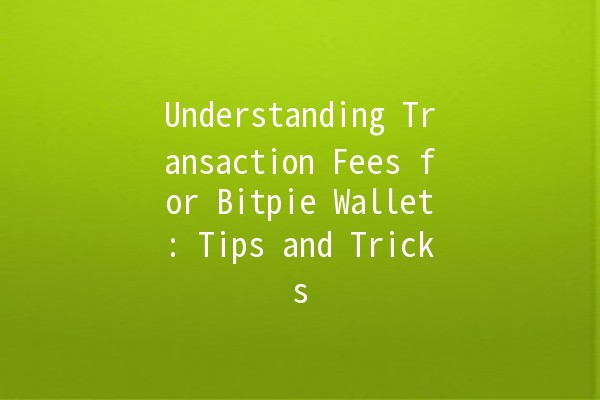
In the world of cryptocurrency, wallets play a crucial role in managing digital assets. One such wallet is Bitpie, which has gained popularity due to its userfriendly interface and robust security features. However, understanding the transaction fees associated with Bitpie is essential for anyone looking to optimize their cryptocurrency transactions. This article aims to provide insights into these fees and offer practical tips to help users minimize costs and enhance their trading experience.
What Are Transaction Fees?

Transaction fees are charges that network participants pay to miners for processing and validating transactions on the blockchain. These fees serve multiple purposes, including:
In the context of Bitpie Wallet, these fees can vary based on several factors such as network congestion and the cryptocurrency being transacted.
Transaction Fees in Bitpie Wallet
Bitpie Wallet handles various cryptocurrencies, each of which may have different transaction fee structures. To make informed decisions, users should be aware of the following key factors that influence fees:
5 Tips for Reducing Transaction Fees in Bitpie Wallet
Explanation: Before initiating a transaction, check the current network conditions for the specific cryptocurrency. Websites like Blockchain.com or EthGasStation provide realtime data on average transaction fees.
Example: If you notice that Bitcoin fees are unusually high during a particular day, consider waiting for a less congested time to make your transaction.
Explanation: Transaction fees can vary during different times of the day or week. Performing transactions during offpeak hours can lead to lower fees.
Example: Many users find that weekends often have lower network activity, which translates to reduced fees.
Explanation: Some wallets allow users to set custom fees. If you are not in a hurry, consider setting a lower fee and wait for confirmation.
Example: Bitpie Wallet may offer a variety of fee options. Selecting a "slow" option can save money on minor transactions.
Explanation: If you plan to send multiple transactions, consolidate them into a single transaction when possible. Batching reduces the overall fees paid.
Example: Instead of sending five separate Bitcoin transactions, group them into one transaction that covers all recipients.
Explanation: If the market allows, choose cryptocurrencies with lower transaction fees and less congestion for certain payments.
Example: Using Litecoin or Stellar for smaller transactions can often incur lower fees compared to Bitcoin, making them costeffective alternatives.
Managing Fees Effectively
Understanding how transaction fees work in Bitpie Wallet can greatly enhance your overall cryptocurrency experience. Being proactive and informed allows users to save money and time while ensuring their transactions are secure and reliable.
Additional Considerations
Security vs. Cost: Balance the need for fast transactions with the associated costs. Occasionally, paying a higher fee for urgent transactions may be necessary.
Wallet Updates: Keep the Bitpie Wallet updated to benefit from any new features that may help in managing transaction fees.
Common Questions About Bitpie Wallet Transaction Fees
Transaction fees can change frequently, often depending on network congestion and overall demand within the blockchain ecosystem. Fees might spike during times of high usage or significant market events, so users should always check current rates before initiating transactions.
Yes, Bitpie Wallet typically offers options for users to choose their transaction fees. Options might range from low (with slower confirmation times) to high (for quicker confirmations). Adjusting these settings allows users to exercise control over their expenses.
The average Bitcoin transaction fee fluctuates based on network conditions. Users can expect to see fees ranging anywhere from a few cents to several dollars depending on the speed of confirmation desired. Always check current rates through the wallet interface.
Yes, there are usually fees associated with sending cryptocurrencies from any wallet, including Bitpie. These fees are necessary for processing and validating transactions on the respective blockchain.
Bitpie Wallet does not charge additional fees beyond the transaction fees set by the network itself. However, it is always wise to review the terms of service to ensure complete understanding of any potential fees.
To minimize transaction fees, you can monitor network conditions, select appropriate transaction times, adjust fee settings, batch transactions, and consider using alternative cryptocurrencies for specific transactions.
Keeping these tips in mind can help you navigate transaction fees effectively in Bitpie Wallet while managing your digital assets. Understanding the dynamics of transaction fees not only enhances your trading experience but also ensures you are making the most costeffective decisions in your cryptocurrency journey.

